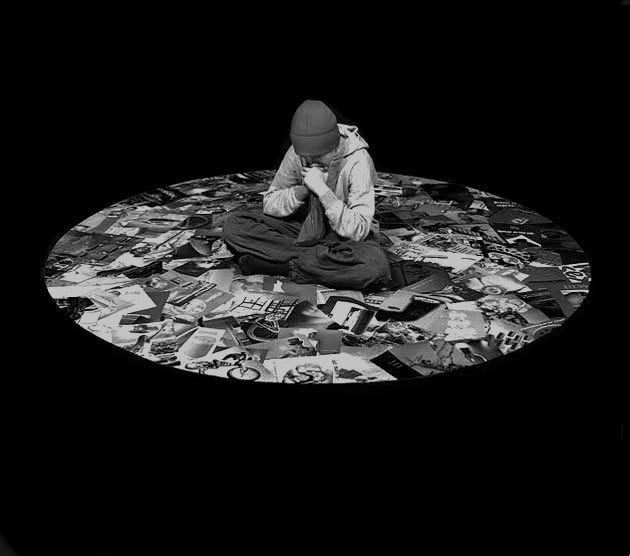
Q. Does the bridge of compassion require continual maintenance?
A. I do not think so. It requires acknowledgement rather than maintenance. That is the mentallity of wealth; that you acknowledge that the bridge is there.
Q. What do you do when you are afraid of someone, perhaps with reason? For me, this destroys compassion.
A. Compassion is not looking down upon someone who needs help, who needs care, but it is general, basic, organic, positive thinking. The fear of someone else seems to generate uncertainty as to who you are. That is why you are afraid of that particular situation or person. Fear comes from uncertainty. If you know exactly how you are going to handle this frightful situation, then you have no fear. Fear comes from panic, bewilderment of uncertainty. Uncertainty is related to distrust in yourself, feeling that you are inadequate to deal with that mysterious problem which is threatening you. There is no fear if you really have a compassionate relationship with yourself, because then you know what you are doing. If you know what you are doing, then your projections also become methodical or predictable, in some sense. Then one developes prajna, knowledge of how to relate to any given situation.
Q. What do you mean by projections in this context?
A. Projection is the mirror reflection of yourself. Because you are uncertain about yourself, the world reflects that uncertainty back to you and the reflection begins to haunt you. Your uncertainty is haunting you, but it is merely your reflection in the mirror.
Q. What do you mean by saying that, if you are compassionate towards yourself, then you know what you are doing?
A. These two aspects of meditation always appear simultaneaously. If you are opening to yourself and have a positive attitude towards yourself, then automatically you know what you are doing because you are not a mystery to yourself. This is jnana, "wisdom," spontaneously-existing-awareness-wisdom." You know that you are spontaneously existing, you know what you are, therefore you can afford to trust yourself at the same time.
Q. If I really were to make friends with myself, then I wouldn't be afraid of making mistakes all the time?
A. That's it. The Tibetan word for wisdom is yeshe, which means "primordial intelligence." You are yourself at the beginning of any beginning. You could almost call it "unoriginated trust in yourself." You do not have to find the beginning at all. It is a primordial situation, so there is no point in trying to logically find the beginning. It is already. It is beginningless.
{A Conversation with Chögyam Trungpa ~ Cutting Through Spiritual Materialism}

{Images Linked/Programming by DPC}
A. I do not think so. It requires acknowledgement rather than maintenance. That is the mentallity of wealth; that you acknowledge that the bridge is there.
Q. What do you do when you are afraid of someone, perhaps with reason? For me, this destroys compassion.
A. Compassion is not looking down upon someone who needs help, who needs care, but it is general, basic, organic, positive thinking. The fear of someone else seems to generate uncertainty as to who you are. That is why you are afraid of that particular situation or person. Fear comes from uncertainty. If you know exactly how you are going to handle this frightful situation, then you have no fear. Fear comes from panic, bewilderment of uncertainty. Uncertainty is related to distrust in yourself, feeling that you are inadequate to deal with that mysterious problem which is threatening you. There is no fear if you really have a compassionate relationship with yourself, because then you know what you are doing. If you know what you are doing, then your projections also become methodical or predictable, in some sense. Then one developes prajna, knowledge of how to relate to any given situation.
Q. What do you mean by projections in this context?
A. Projection is the mirror reflection of yourself. Because you are uncertain about yourself, the world reflects that uncertainty back to you and the reflection begins to haunt you. Your uncertainty is haunting you, but it is merely your reflection in the mirror.
Q. What do you mean by saying that, if you are compassionate towards yourself, then you know what you are doing?
A. These two aspects of meditation always appear simultaneaously. If you are opening to yourself and have a positive attitude towards yourself, then automatically you know what you are doing because you are not a mystery to yourself. This is jnana, "wisdom," spontaneously-existing-awareness-wisdom." You know that you are spontaneously existing, you know what you are, therefore you can afford to trust yourself at the same time.
Q. If I really were to make friends with myself, then I wouldn't be afraid of making mistakes all the time?
A. That's it. The Tibetan word for wisdom is yeshe, which means "primordial intelligence." You are yourself at the beginning of any beginning. You could almost call it "unoriginated trust in yourself." You do not have to find the beginning at all. It is a primordial situation, so there is no point in trying to logically find the beginning. It is already. It is beginningless.

{Images Linked/Programming by DPC}

